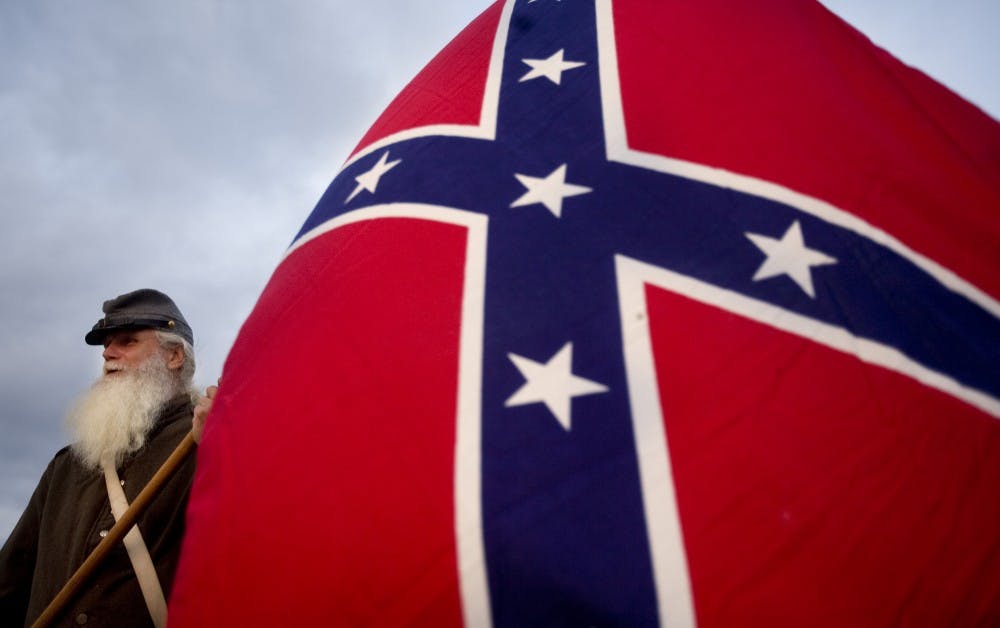Editor's note: This is in response to columnist Derrik Rochwalik's column "Confederate flag causing quite the conundrum."
Texas’s recent opposition to allowing a Confederate Battle Flag to grace its license plates has settled into a Supreme Court case against the Sons of Confederate Veterans. The issue in court is whether the plates are government speech and thereby subject to the First Amendment, but the greater debate should center on whether the Confederate Battle Flag ought to be permitted in the public sphere.
One common notion that emerges from talks about Confederate symbols is that slavery is over, and black people need to “get over it.” On this point, I would agree. Slavery, the institution itself, is an anachronism that is 150 years gone from our day-to-day lives. But its effects are still felt nationwide by every black member of our citizenry, in the form of institutional discrimination, police brutality and so much more. These are the issues that we need to focus our energy on, not anger over slavery of the past.
Accordingly, if protesting the very real racial and oppressive associations with and consequences of the Confederate Battle Flag is invalid, then how ludicrous is it to celebrate the bespeckled rag nowadays? The knife cuts both ways; if people want to keep the Confederate Battle Flag and celebrate its history, then they need to own it.
All of it.
Own the associations and bloody history behind the symbol, own the fact that opposition to the flag is at an all-time high and accept that the Confederate Battle Flag will always be inextricably linked to slavery and oppression. Perception is reality, and this is how Americans generally view the flag regardless of the intent of its advocates.
Arguments for keeping the flag as a relevant public symbol range from historical context, to blanket patriotism to, inexplicably, moral superiority for a war protecting the institution of slavery. As spokesman Marshall Davis of the Sons of Confederate Veterans so eloquently put it, “The American flag flew over a slave nation for over 100 years. The Confederate flag flew over a slave nation for four years. By comparison, the American flag is 25 times more a slave flag.”
Now, to be fair, the Civil War was not fought over slavery, it was fought for states’ rights — specifically and most significantly, their right to expand ownership of slaves to the new western territories. And to be sure, Lincoln may have ended slavery in the South primarily for political and economic reasons, but let’s not forget that he followed through in 1865 by facilitating future passage of the 13th Amendment that year, after his assassination. And to address Davis’ brilliant mathematical morality; a nation whose flag flew over a slave-holding populace for every moment of its tenure is decidedly worse than one whose flag flew for those same ideals during less than half of its (continued) existence. If the Confederacy had lasted longer, you can be certain that slavery in geographical America would have continued unhindered as well.
The South is full of sore losers. Because when Lincoln won the 1860 election despite not being present on the ballot in 10 states (because no citizens in the South would publicly show Lincoln support, a prerequisite for distributing a candidate’s ballots in a given state), they decided to split from the union before he even stepped foot into the White House. Now, as we approach the 150th Anniversary of the Civil War’s conclusion, patriots from those same states can’t help themselves from still brandishing the battle flag that has become so ubiquitous with racism and slavery.
Why would groups like the Sons of Confederate Veterans have to work so arduously to separate the Confederate Battle Flag from racism, hatred and oppression unless people widely recognize it as a symbol of such? When neo-Nazis adopt the flag, when the Ku Klux Klan adopts the flag, they aren’t making a nebulous connection between their ideals and the symbols they select. There is a measured intention in choosing this particular flag for their hate rallies and bigot marches.
If the goal for our Southern brothers and sisters is “heritage over hate,” then why don’t the affected groups simply use the Stars and Bars as a way to celebrate their family history and ancestry? The Stars and Bars still represent the historical significance of the Confederacy, while keeping insulated from the racial and ideological tension inherent in exhibiting the Battle Flag. It’s a common-sense solution that can leave Southern pride unmarred and groups still receptive to the horrors of the past unfazed.
Nobody is trying to throw the Confederate Flag and our shared American history down the memory hole, so it would be just quaint if modern-day Americans would not place the same banner on a memory pedestal, either. Celebrating the soldiers who gave their lives fighting the Civil War is not the issue here; elevating the misguided-at-best-vile-at-worst mindset that led to our nation’s fracturing a century and a half ago is the problem. There is no more battle to fight; it is due time to retire the Confederate Battle Flag from the public sphere.
Reach the columnist at hfinzel@asu.edu or follow @OnlyH_Man on Twitter.
Like The State Press on Facebook and follow @statepress on Twitter.
Editor’s note: The opinions presented in this column are the author’s and do not imply any endorsement from The State Press or its editors.
Want to join the conversation? Send an email to opiniondesk.statepress@gmail.com. Keep letters under 300 words and be sure to include your university affiliation. Anonymity will not be granted.




